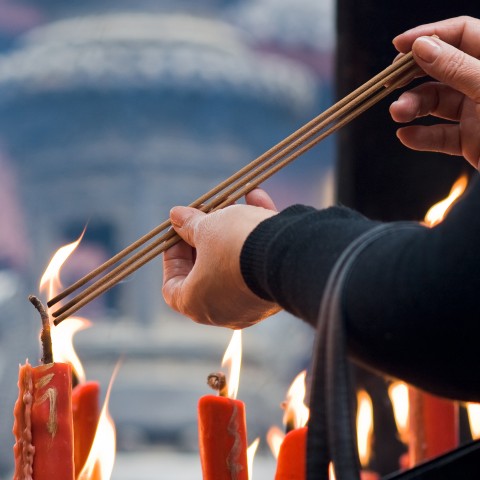Of China’s three ghost-related festivals, the Hungry Ghost Festival is the most important. The Hungry Ghost Festival, Chinese culture dictates, is when people worship and show great respect to the dead. The Chinese believe that on this day, the gates of hell are open, allowing the spirits of dead ancestors to roam the earth until the gates shut again.
Learn about the Chinese Ghost Festival with ChineseClass101.com and gain a greater understanding of Chinese culture as a whole. Immersing yourself in a country’s culture is the most effective way of mastering its language, and we hope to make it both fun and informative!
1. What is the Ghost Festival in China
The Chinese Ghost Festival, like its Qingming (or Tomb Sweeping Day) holiday, is a ghost-related holiday and one of great cultural significance. The old saying, according to the Hungry Ghost Festival origin, is that on this day, ghosts return from the underworld and wander on the earth.
Hence, people worship their ancestors through Hungry Ghost Festival offerings to drive evil away and have their families blessed.
2. When is the Chinese Ghost Festival?

The date of the Ghost Festival varies each year on the Gregorian calendar. For your convenience, here’s a list of this holiday’s date for the next ten years.
- 2019: August 15
- 2020: September 2
- 2021: August 21
- 2022: August 12
- 2023: August 30
- 2024: August 17
- 2025: September 6
- 2026: August 27
- 2027: August 16
- 2028: September 2
3. Chinese Ghost Festival Traditions & Customs
On this day, people give steamed buns to those deceased family members who they believe have lost their connections, to keep their hunger at bay on their way to the underworld. There is also a custom of illuminating lights during the Ghost Festival, to send ghosts off and guide them back to the underworld. It sounds a little creepy, right?
Worshiping ancestors during the Ghost Festival is slightly different from Tomb Sweeping Day. First, people worship at noon. Usually, they prepare a full table of delicious dishes; the good Ghost Festival food shows the ghosts that they are living a happy life, and their ancestors don’t need to worry about them. Families with elderly people will pay more attention to details such as arranging seven pairs of chopsticks, seven wine glasses, and a carved wooden fruit box, in order to show respect to their ancestors.
There is a Chinese saying that “ghosts won’t knock at the doors of those with a good conscience,” meaning that evil won’t come if a person doesn’t do bad things; it will go away instead.
4. Traditional Taboos
During the Hungry Ghost Festival, there are two things that you’d better not do.
To avoid running into ghosts, people believed in ancient times that moving to new houses and marrying should be avoided throughout the ghost month.
Essentially, any important or life-altering events/actions should be avoided during this holiday, as hungry ghosts could easily make a mess of things.
Other taboos include:
- You shouldn’t go out at midnight as this increases your chance of running into ghosts.
- You shouldn’t wear red cord accessories.
- You shouldn’t bring bells.
- You shouldn’t hang and dry clothes.
- You shouldn’t pick money up off the street.
5. Useful Vocabulary for the Chinese Ghost Festival
Here’s some vocabulary you should know for the Chinese Ghost Festival!
- 祖先 (zǔxiān) — ancestor
- 纸钱 (zhǐqián) — Joss paper
- 中元节 (Zhōngyuán Jié) — Ghost Festival
- 烧香 (shāoxiāng) — burn incense
- 孝 (xiào) — filial piety
- 祭奠死者 (jìdiàn sǐzhě) — hold a memorial ceremony for the deceased
- 纸扎祭品 (zhǐzhā jìpǐn) — varieties of paper items burned for the deceased
- 游魂 (yóuhún) — wandering soul
- 素食 (sùshí) — vegetarian meal
- 阎罗王 (Yán Luó Wáng) — Yama
- 祭祀 (jìsì) — sacrificial offering
To hear each of these vocabulary words pronounced, check out our Chinese Ghost Festival vocabulary list!
Conclusion: Choose ChineseClass101 for Total Language Mastery
What do you think about the Chinese Hungry Ghost Festival? Does your country have a day to worship or honor the dead? Let us know in the comments! We love hearing from you.
To continue learning about Chinese culture’s many facets and begin speaking the language like a native, explore ChineseClass101.com and take advantage of our many fun and practical learning tools! Read more insightful blog posts like this one, study our free Chinese vocabulary lists, and download our mobile apps for convenient learning! By upgrading to Premium Plus, you can also begin learning Chinese one-on-one with your own teacher and personalized plan.
With ChineseClass101, the learning options are endless and you have our constant support. Your hard work will pay off, and success in Chinese is yours!












